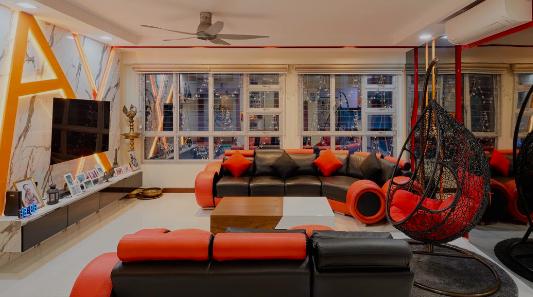World of Interior Designing Jobs in Nigeria, Opportunities and Benefits

Interior design, the art and science of enhancing the interior of a space to create a more aesthetically pleasing and functional environment, is a burgeoning industry globally, and Nigeria is no exception. In recent years, there has been a growing appreciation for well-designed spaces, leading to an increased demand for skilled interior designers. This comprehensive exploration delves into the world of interior designing jobs in Nigeria, covering the scope of the industry, the role of interior designers, educational pathways, benefits of pursuing a career in interior design, challenges faced, and the evolving landscape of the profession.
The Scope of Interior Designing in Nigeria
1 Residential Interior Design
Residential interior design involves creating visually appealing and functional spaces within homes. Interior designers working in the residential sector collaborate with homeowners to enhance the aesthetics and functionality of living spaces, including bedrooms, kitchens, and living rooms.
2 Commercial Interior Design
Commercial interior design focuses on creating engaging and efficient spaces for businesses. Interior designers in this sector work on projects such as office spaces, retail stores, restaurants, and hotels, ensuring that the design aligns with the brand image and meets the needs of employees and customers.
3 Hospitality Interior Design
Hospitality interior design centers around creating inviting and comfortable spaces within the hospitality industry. This includes hotels, resorts, and restaurants, where interior designers strive to evoke a specific atmosphere that complements the brand and enhances the guest experience.
4 Healthcare Interior Design
Healthcare interior design involves creating healing and functional environments within healthcare facilities. Interior designers working in this sector consider factors such as patient comfort, accessibility, and infection control while designing spaces like hospitals, clinics, and medical offices.
5 Educational Interior Design
Educational interior design focuses on creating conducive and inspiring learning environments. Interior designers collaborate with educational institutions to design classrooms, libraries, and common areas that promote effective learning and engagement.
The Role of Interior Designers in Nigeria
1 Client Consultation
Interior designers in Nigeria begin their projects with client consultations. This involves understanding the client’s vision, preferences, and requirements for the space, ensuring that the final design aligns with the client’s goals.
2 Space Planning and Layout
Space planning is a fundamental aspect of interior design. Designers must optimize the use of available space, ensuring that furniture, fixtures, and other elements are arranged in a way that maximizes functionality and visual appeal.
3 Color and Material Selection
Interior designers are responsible for selecting appropriate colors and materials for each project. This includes choosing paint colors, fabrics, flooring, and finishes that harmonize with the overall design concept and the client’s preferences.
4 Furniture and Fixture Selection
Selecting furniture and fixtures that complement the design is a crucial aspect of the interior designer’s role. Designers must consider factors such as style, comfort, and functionality while curating a cohesive and aesthetically pleasing look.
5 Lighting Design
Lighting plays a significant role in interior design, affecting both the functionality and ambiance of a space. Interior designers in Nigeria consider natural and artificial lighting, selecting fixtures that enhance the overall design while meeting practical needs.
6 Project Management
Interior designers are often involved in project management, overseeing the execution of the design plan. This includes coordinating with contractors, vendors, and other professionals to ensure that the design vision is realized within the specified timeline and budget.
7 Sustainable Design Practices
With a growing emphasis on sustainability, interior designers in Nigeria are increasingly incorporating eco-friendly and energy-efficient design practices. This may include the use of recycled materials, energy-efficient lighting, and sustainable furniture choices.
8 Keeping Up with Trends
Staying updated on design trends is crucial for interior designers. Whether it’s adopting new styles, incorporating emerging technologies, or understanding cultural influences, designers must continually evolve to meet the changing preferences of clients and the market.
Educational Pathways for Interior Designers in Nigeria
1 Formal Education in Interior Design
Many interior designers in Nigeria pursue formal education in interior design, either through diploma programs, bachelor’s degrees, or master’s degrees. Formal education provides a solid foundation in design principles, space planning, and the technical skills needed for the profession.
2 Specialized Interior Design Courses
Apart from formal education, interior designers can enhance their skills through specialized courses. These courses may focus on specific aspects of interior design, such as color theory, furniture design, or sustainable design practices.
3 Apprenticeships and Internships
Practical experience is invaluable in the field of interior design. Aspiring designers can seek apprenticeships or internships with established design firms or professionals, gaining hands-on experience and exposure to real-world projects.
4 Professional Certifications
Some interior designers in Nigeria choose to pursue professional certifications to validate their skills and knowledge. Certifications from reputable organizations can enhance credibility and open up opportunities for career advancement.
Benefits of Pursuing a Career in Interior Design in Nigeria
1 Creativity and Expression
Interior design allows individuals to express their creativity and artistic flair. Designers have the opportunity to create unique and visually appealing spaces that reflect their personal style and design philosophy.
2 High Demand for Design Professionals
As the demand for well-designed spaces continues to grow in Nigeria, there is a corresponding demand for skilled interior designers. This presents ample opportunities for professionals in the field to find rewarding and fulfilling employment.
3 Entrepreneurial Opportunities
Many interior designers in Nigeria choose to start their own design firms or work as independent consultants. This entrepreneurial aspect of the profession allows designers to have greater control over their projects and client relationships.
4 Impact on Quality of Life
Interior design has a direct impact on the quality of life of individuals who inhabit designed spaces. Well-designed environments contribute to comfort, functionality, and overall well-being, creating positive living and working experiences.
5 Diverse Project Types
Interior designers have the flexibility to work on a wide range of projects across various sectors. From residential homes to commercial spaces and healthcare facilities, designers can diversify their portfolios and work on projects that align with their interests.
6 Collaboration and Networking
Interior design involves collaboration with various professionals, including architects, contractors, and suppliers. This collaborative aspect allows designers to build a robust professional network and gain exposure to different facets of the design and construction industry.
7 Continuous Learning
The dynamic nature of design means that there is always room for learning and growth. Interior designers can stay engaged and challenged by staying updated on industry trends, new materials, and innovative design practices.
Challenges Faced by Interior Designers in Nigeria
1 Budget Constraints
Working within budget constraints is a common challenge for interior designers. Clients may have financial limitations, requiring designers to find creative solutions that align with budgetary restrictions.
2 Limited Awareness of Design Importance
While awareness of the importance of interior design is growing, some clients may still underestimate its value. Convincing clients of the impact of well-designed spaces can be a hurdle for designers.
3 Regulatory Challenges
In some cases, interior designers in Nigeria may face regulatory challenges, especially in terms of licensing and certification. Advocacy for professional recognition and adherence to industry standards is an ongoing effort in the field.
4 Project Timelines
Meeting tight project timelines can be challenging, especially when coordinating with multiple stakeholders. Delays in construction, unforeseen issues, or changes in client preferences can impact the original project schedule.
5 Balancing Aesthetics and Functionality
Finding the right balance between aesthetics and functionality can be a challenge for interior designers. Ensuring that the design not only looks visually appealing but also meets the practical needs of the users requires careful consideration.
The Evolving Landscape of Interior Design in Nigeria
1 Technology Integration
Technology is increasingly becoming an integral part of interior design. Virtual reality (VR), 3D modeling, and computer-aided design (CAD) software are revolutionizing the design process, allowing designers to create realistic visualizations and improve collaboration.
2 Sustainability Practices
Sustainable design practices are gaining prominence in Nigeria. Interior designers are incorporating eco-friendly materials, energy-efficient solutions, and sustainable design principles to align with global efforts towards environmental conservation.
3 Cultural Fusion
Nigeria’s rich cultural diversity is influencing interior design trends. Designers are incorporating cultural elements, patterns, and materials into their projects, creating spaces that reflect the unique identity of the country.
4 Wellness and Biophilic Design
Wellness-focused design and biophilic design, which integrates natural elements into indoor spaces, are gaining traction. Interior designers are exploring ways to create environments that promote well-being, health, and a connection to nature.
5 Remote Collaboration
The rise of remote work and virtual collaboration has impacted the interior design industry. Designers are adapting to virtual client meetings, online project presentations, and digital collaboration tools to connect with clients and stakeholders.
Conclusion
In conclusion, interior designing jobs in Nigeria offer a dynamic and rewarding career path for individuals passionate about creating aesthetically pleasing and functional spaces. The profession encompasses a wide range of sectors, providing diverse opportunities for designers to specialize and excel.
While the field presents numerous benefits, interior designers in Nigeria also face challenges, ranging from budget constraints to regulatory hurdles. However, the evolving landscape of interior design, marked by technological advancements, sustainability practices, and cultural fusion, opens up new possibilities and avenues for growth in the profession.
As Nigeria continues to experience economic development and an increased focus on quality living spaces, the role of interior designers becomes even more crucial. Those embarking on a career in interior design in Nigeria have the opportunity to contribute to the enhancement of living and working environments, leaving a lasting impact on the visual landscape of the nation.







